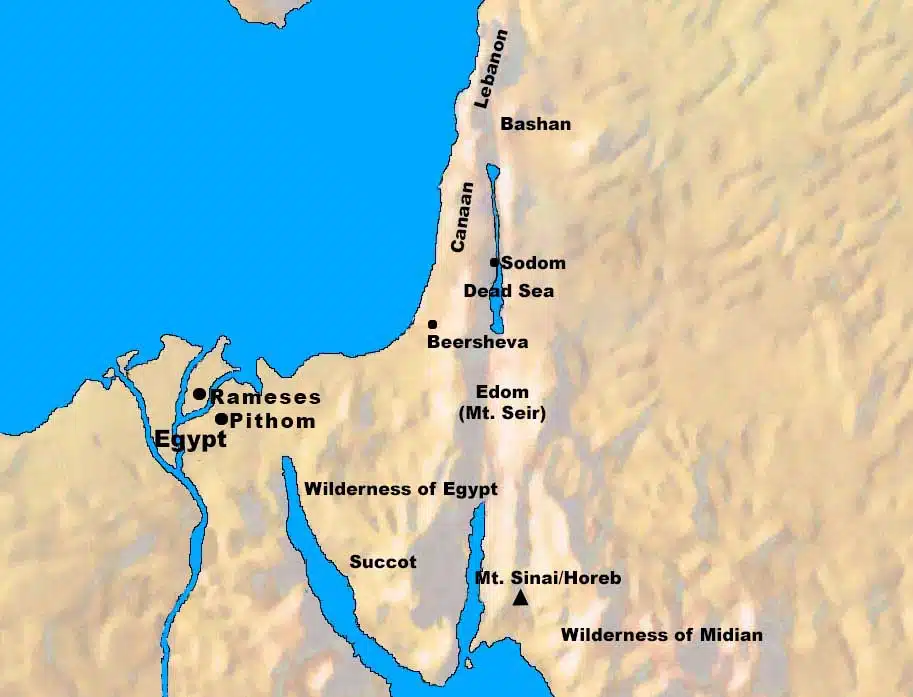The LORD then describes how to make a laver (or basin). It was to be made of bronze and used by the priests to wash their hands and feet before they entered the tabernacle to serve the LORD. The account of its construction is in Exodus 38:8.
The next topic that the Lord spoke to Moses involved another piece of furniture for the tabernacle. Moses was to make a laver (or wash basin) of bronze, with its base of bronze. The bronze came from “the mirrors of the serving women who served at the doorway of the tent of meeting” (Exod. 38:8). The purpose of the laver was for washing. The LORD instructed Moses to put it between the tent of meeting and the altar. This would place it halfway between the altar of burnt offering and the tabernacle tent itself. Moses then was told to put water in it.
The laver was designed so that Aaron and his sons shall wash their hands and their feet from it. This washing symbolized the necessity to be cleansed in order to serve in the LORD’s presence. Both the hands (what they did) and their feet (where they went) needed to be cleaned before they enter the tent of meeting. The washing was to be taken seriously. The LORD warned them that they shall wash with water, so that they will not die. A lack of ritual cleanliness before the LORD was a capital offense. This washing was necessary when they approach the altar to minister, by offering up in smoke a fire sacrifice to the Lord.
Verse 21 summarizes the laver and its use. The priests were to wash their hands and their feet, so that they will not die. Cleansing was crucial before service. Further, this is not just for the current generation—it shall be a perpetual statute for them, for Aaron and his descendants throughout their generations.
In the New Testament, washing was important as well. Jesus washed the disciples’ feet at the Last Supper (John 13:5). Jesus told Peter if he did not allow Jesus to wash his feet Peter would have no part with Him. This mirrors cleanliness before service. Jesus emphasized service among the disciples, and said “He who has bathed needs only to wash his feet, but is completely clean” (John 13:10). Washing their feet allowed them to be ready for service to Him, their Savior. Jesus then commanded that the disciples “wash one another’s feet” (John 13:14) as a sign of submission and service to one another. This “washing” prepared them for service to God.
Many think Jesus’ washing of the disciple’s feet also signifies forgiveness. This would be consistent with passages such as Matthew 6:14-15. There Jesus explains to His listening disciples why the centerpiece of the model prayer asks God to forgive us “as we have forgiven.” Jesus explains:
“For if you forgive others for their transgressions, your heavenly Father will also forgive you. But if you do not forgive others, then your Father will not forgive your transgression.”
This makes it clear that service to God is intertwined with service to others. And walking in fellowship with God, which requires His ongoing forgiveness, requires that we forgive others.
Biblical Text:
17 The Lord spoke to Moses, saying, 18 “You shall also make a laver of bronze, with its base of bronze, for washing; and you shall put it between the tent of meeting and the altar, and you shall put water in it.19 Aaron and his sons shall wash their hands and their feet from it; 20 when they enter the tent of meeting, they shall wash with water, so that they will not die; or when they approach the altar to minister, by offering up in smoke a fire sacrifice to the Lord. 21 So they shall wash their hands and their feet, so that they will not die; and it shall be a perpetual statute for them, for Aaron and his descendants throughout their generations.”
Check out our other commentaries:
-
Matthew 8:14-17 meaning
Matthew records his third account of a specific miracle. Jesus heals Peter’s mother-in-law of a fever. Later that evening some people bring Him many who...... -
Jonah 2:6b-9 meaning
The LORD delivers Jonah from the sea when Jonah prayed to Him. Now Jonah gives a testimony of his deliverance and promises to pay the...... -
Romans 15:4-6 meaning
The Bible (Scripture) was written down so that we would be able to learn from it. The Bible encourages us to persevere in faith, which...... -
Romans 15:20-22 meaning
Paul prioritized his travel so that he could preach the gospel to those who did not know Christ. He again explains that he had not...... -
Exodus 4:13-17 meaning
Moses’ fifth objection can be summarized by the phrase “Find someone else.” ......



